Are you passionate about sustainability and considering options for eco-friendly electric vehicle charging? Look no further than solar electric car charging stations. These innovative and sustainable charging points utilize solar power, providing a green energy solution for your electric vehicle.
By harnessing the power of the sun, solar-powered EV stations offer a renewable energy charging facility that allows you to charge your car while minimizing your carbon footprint. Not only does this contribute to a cleaner environment, but it also helps reduce reliance on fossil fuels.
In this comprehensive guide, I will walk you through the process of charging your electric car with solar panels. From the considerations you need to keep in mind before making the switch to the benefits of installing a home charge point, we will cover all the essential information you need to know.
Stay tuned as we explore the cost aspects of solar panels for charging your car, discuss the exciting group-buying discounts offered by Solar Together, and highlight the advantages of electric vehicles and solar charging. We will also explain how solar energy and EV charging work together harmoniously.
Get ready to embark on a journey towards a sustainable future with solar-powered electric vehicle charging stations!
Key Takeaways:
- Solar electric car charging stations provide an eco-friendly and sustainable energy charging point.
- Charging your electric car with solar panels helps reduce your carbon footprint and reliance on fossil fuels.
- Installing a home charge point offers faster charging for your EV and allows you to take advantage of solar energy.
- Consider the cost of solar panels for EV charging, including installation expenses and long-term savings.
- Solar Together offers group-buying discounts on affordable solar panels and batteries, along with additional services such as EV charge point installation.
How to Charge Your Electric Car with Solar Panels
Charging your electric car with solar panels is an eco-friendly and sustainable way to power your vehicle. By harnessing the sun’s energy, you can reduce your carbon footprint and enjoy the benefits of clean transportation. However, there are some considerations to keep in mind before you make the switch to solar charging.
First and foremost, it is essential to have solar panels installed to generate the electricity needed to charge your electric car. Solar panels, also known as photovoltaic (PV) panels, convert sunlight into usable energy. These panels are typically mounted on rooftops or in open areas to maximize sun exposure. Having a sufficient number of solar panels will ensure that you have enough power to charge your electric car efficiently.
Considerations for Solar Charging
When charging your electric car with solar panels, you should consider the following:
- Orientation and Tilt: The orientation and tilt of your solar panels can affect their efficiency. Ideally, solar panels should face south or southwest in the UK to maximize sun exposure throughout the day.
- Shading: Avoid shading on your solar panels as it can decrease their performance. Make sure the panels are free from obstructions such as trees, buildings, or other objects that cast shadows.
- Battery Storage: Using a solar battery allows you to store excess energy generated by your panels for later use. This can be particularly useful for charging your electric car during non-sunny periods or at night.
- Grid Connection: It is recommended to have a grid connection as a backup when your solar panels cannot generate enough electricity to charge your electric car fully. This ensures you have a reliable power source, especially during periods of low sunlight.
There are two different methods of charging an electric car with solar panels:
- Direct Charging: With this method, the electricity generated by the solar panels is fed directly into the electric car’s battery. It is a straightforward and efficient way to utilize solar energy for charging.
- Indirect Charging: In this method, the solar panels generate electricity that is fed into your home’s electrical grid. From there, you can charge your electric car using the grid power. This method is useful if you want to take advantage of time-of-use tariffs or if your electric car requires a specific charging station.
In conclusion, charging your electric car with solar panels is an environmentally-friendly and cost-effective option. With careful consideration of panel orientation, shading, battery storage, and grid connection, you can maximize the benefits of solar charging. Whether you choose direct or indirect charging, harnessing solar energy for electric vehicle charging is a step towards a greener future.
| Advantages | Considerations |
|---|---|
| Reduces carbon footprint | Panel orientation and tilt |
| Cost-effective in the long run | Shading avoidance |
| Energy independence | Battery storage |
| Utilizes sustainable energy | Grid connection |
Benefits of Installing a Home Charge Point
Installing a dedicated home charge point for your electric car comes with numerous advantages that enhance your charging experience. Let’s explore the benefits of having a home charge point and why it is a wise investment for EV owners.
1. Faster Charging
One of the key advantages of installing a home charge point is faster charging for your electric vehicle. With a dedicated charger at home, you can enjoy significantly reduced charging times compared to using a standard electrical outlet. This means you can conveniently charge your car overnight and wake up to a fully charged vehicle in the morning, ready for your daily commute or adventures.
2. Harnessing Solar Energy
By installing a home charge point, you have the opportunity to take advantage of solar energy to power your electric car. Solar panels on your property can generate clean and renewable energy that can be utilized to charge your EV. This not only reduces your reliance on the electrical grid but also allows you to tap into a sustainable and eco-friendly energy source for your transportation needs. Charging your car with solar energy contributes to a greener and more sustainable future.
3. Battery Health and Longevity
A dedicated home charge point can help in preserving your electric car’s battery life. In contrast to using public charging stations or relying solely on fast chargers, home charging typically involves slower and gentler charging rates. This approach promotes optimal battery health and longevity by reducing the stress on the battery cells. Additionally, home charging allows you to follow best practices, such as avoiding frequent deep discharges and maintaining a more consistent charging routine.
4. Environmental Benefits
Charging your electric vehicle at home with solar energy offers significant environmental benefits. By using clean, renewable energy to power your car, you can reduce your carbon footprint and contribute to mitigating climate change. Charging at home eliminates the emissions associated with traditional fossil fuel-powered vehicles, helping improve air quality and promote sustainable transportation.
It’s important to note that installing a home charge point requires consultation with professionals experienced in EV charging infrastructure. They can assess your property’s electrical capacity, recommend suitable charging solutions, and ensure a safe and efficient installation.
By installing a home charge point, you can enjoy faster, more convenient charging, harness the power of solar energy, extend your battery’s lifespan, and contribute to a cleaner environment. Now, let’s see a table summarizing the benefits of home charging:
| Benefits of Installing a Home Charge Point |
|---|
| Faster Charging |
| Harnessing Solar Energy |
| Battery Health and Longevity |
| Environmental Benefits |
Investing in a home charge point not only enhances your electric vehicle charging experience but also aligns with the sustainable and eco-friendly ethos of the EV movement.
The Cost of Solar Panels for Charging Your Car
When considering the switch to solar energy for charging your electric vehicle, it’s essential to understand the cost implications involved. Installing solar panels to power your car comes with initial expenses that need to be taken into account.
The cost of solar panels for EV charging:
The expenses of solar panel installation can vary depending on various factors, such as the size of the solar system, the complexity of the installation process, and regional price variations.
On average, the cost of solar panels for EV charging can range from $10,000 to $30,000, including installation. However, it’s crucial to get multiple quotes from reputable solar panel installation companies to compare prices and find the best deal for your specific needs.
Expenses of solar panel installation:
The expenses of solar panel installation encompass not just the cost of the panels themselves, but also the associated equipment, labor costs, and permitting fees. These expenses can add up, so it’s crucial to factor them into your budget when considering solar charging for your electric car.
Savings with solar charging:
While the upfront costs of solar panel installation may seem significant, it’s important to consider the potential long-term savings. Once your solar panels are installed, you can expect substantial savings on your electricity bills as you generate your own clean energy to charge your electric vehicle.
According to estimates, homeowners can save an average of $1,000 per year on electricity bills by charging their electric cars with solar panels. Over time, these savings can offset the initial investment and provide significant financial benefits for EV owners.
Moreover, choosing solar charging over public charging stations can also save you money in the long run. Public charging stations often come with additional costs or memberships, which can add up over time. By utilizing solar energy, you can enjoy the convenience of charging at home without the extra expenses.
Overall, while the cost of solar panels for charging your car may pose an initial investment, the potential long-term savings on electricity bills and the avoidance of public charging costs make solar charging an attractive option for EV owners.
Solar Together: Group-Buying Discounts on Solar Panels
Introducing Solar Together, a groundbreaking program that offers group-buying discounts on solar panels and batteries. With Solar Together, homeowners can now access affordable solar panels and maximize their savings on solar panel installation.
Solar Together works by leveraging the power of group-buying, allowing participants to enjoy significant discounts on solar panels compared to individual purchases. By pooling together a large number of customers, Solar Together is able to negotiate competitive prices and pass on the savings directly to you.
But the benefits of Solar Together don’t stop at lower prices. When you join the program, you also gain access to additional services such as battery storage and EV charge point installation. This means you can store excess solar energy for later use and even charge your electric vehicle using clean and sustainable power.
One of the key advantages of Solar Together is its rigorous vetting process for suppliers. The program carefully selects reputable and experienced solar installers who meet high-quality standards and have a proven track record. This ensures that you receive professional installation services and reliable solar panels that will serve you for years to come.
Moreover, as a participant in Solar Together, you’ll benefit from customer protection guarantees. This provides you with peace of mind knowing that you’re protected in case of any issues or concerns arising during and after the installation process.

Solar Together at a Glance
| Program Benefits | Features |
|---|---|
| Group-Buying Discounts | Access to affordable solar panels and batteries |
| Additional Services | Battery storage and EV charge point installation |
| Supplier Vetting | High-quality standards and reputable solar installers |
| Customer Protection | Guarantees for peace of mind |
Join Solar Together today and take advantage of the group-buying savings on solar panels. With affordable solar panel installation and added benefits like battery storage and EV charge points, you can enjoy clean and sustainable energy while saving on your electricity bills.
Advantages of Electric Vehicles and Solar Charging
Electric vehicles (EVs) offer a range of advantages over traditional petrol and diesel cars. Not only do they provide a sustainable and eco-friendly mode of transportation, but they also offer significant cost savings in the long run. When combined with solar charging, the benefits of electric vehicles become even more compelling.
One of the key advantages of electric vehicles is their positive impact on the environment. EVs produce zero tailpipe emissions, leading to improved air quality and reduced greenhouse gas emissions. By transitioning from internal combustion engines to electric motors, we can contribute to cleaner air and combat climate change.
Furthermore, electric vehicles offer significant cost savings compared to traditional cars. EV owners can benefit from lower fuel costs and reduced maintenance expenses. Charging an electric vehicle with solar energy takes these savings to another level. By harnessing the power of the sun, you can charge your car for free, eliminating the need for expensive gasoline or diesel.
Solar charging also promotes clean driving. When you charge your electric vehicle with solar energy, you are utilizing a renewable and sustainable source of power. By reducing reliance on fossil fuels, you can decrease pollution and contribute to a greener future.
Combining the advantages of electric vehicles and solar charging creates a powerful solution for sustainable transportation. Not only can you enjoy the benefits of clean driving and reduced emissions, but you can also save money in the long term. Embracing electric vehicles and solar charging is a step towards a more environmentally friendly and cost-effective future.
Embrace the advantages of electric vehicles and the benefits of solar charging to experience clean driving and a greener future.
How Solar Energy and EV Charging Work Together
In today’s world, renewable energy is gaining traction as an eco-friendly and cost-effective alternative to traditional energy sources. When it comes to electric vehicles (EVs), solar energy plays a vital role in powering these vehicles sustainably. In this section, we will explore how solar energy and EV charging work together, highlighting the solar panel charging process, the compatibility of solar PV panels with EVs, and the importance of solar energy in EV charging.
The Solar Panel Charging Process
At the heart of solar energy in EV charging are solar PV panels, which capture sunlight and convert it into electricity. Solar PV panels consist of multiple photovoltaic cells that generate an electric current when exposed to sunlight. This current is then stored in a battery or directly used to charge an electric vehicle.
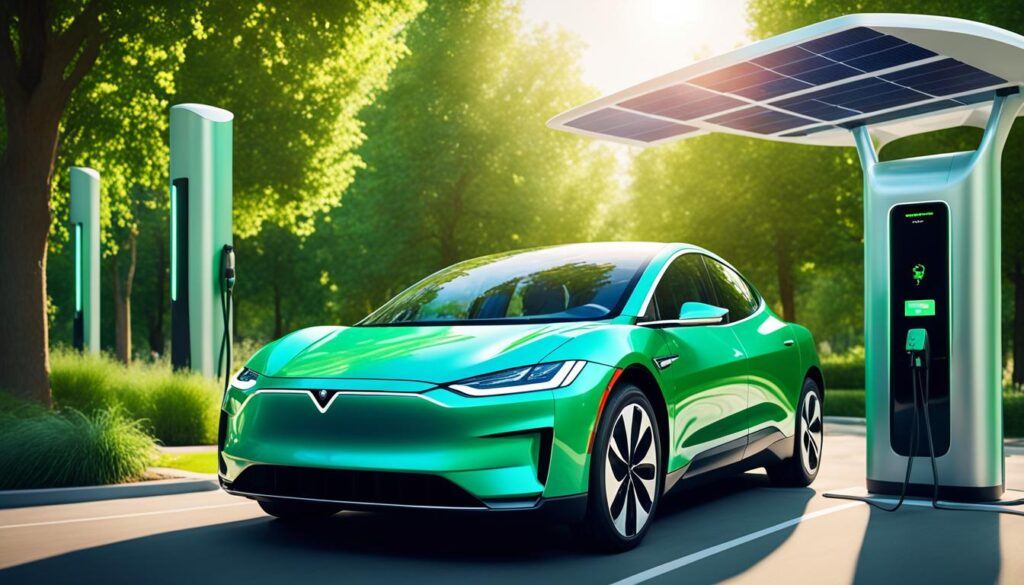
The solar panel charging process begins by installing solar PV panels on rooftops or in open spaces with maximum sunlight exposure. These panels absorb sunlight and convert it into direct current (DC) electricity. An inverter then converts this DC electricity into alternating current (AC) electricity, which is the standard form of electricity used in homes and businesses.
The electricity generated by solar PV panels can be used immediately to charge an electric vehicle or stored in a battery for later use. This storage capability ensures that EVs can be charged even when there is no direct sunlight available, such as during the night or on cloudy days.
Solar PV Panels and EV Compatibility
Electric vehicles are compatible with solar PV panels, allowing owners to harness clean and sustainable energy for their daily transportation needs. EV owners can connect their vehicles directly to the solar panels through an EV charger or a solar-powered battery storage system.
Most modern EVs come equipped with a charging port that can be connected to an EV charger. These chargers can be connected to solar PV panels, allowing the EV to directly draw electricity from the solar energy system. This process ensures that the EV is charged using clean energy, reducing reliance on fossil fuels and minimizing greenhouse gas emissions.
Additionally, homeowners can install a solar-powered battery storage system, which stores excess electricity generated by the solar PV panels. This stored electricity can then be used to charge the EV, even during periods of low solar generation. This combination of solar PV panels and battery storage provides a reliable and sustainable solution for charging EVs.
The Role of Battery Storage
Battery storage plays a crucial role in utilizing solar energy for charging EVs. The stored energy can be used when sunlight is not available, ensuring continuous and reliable EV charging. Moreover, battery storage systems allow for efficient energy management, optimizing the use of solar energy and reducing reliance on the grid.
By utilizing solar energy and battery storage for EV charging, owners can take advantage of low-cost and emission-free transportation. This combination also helps offset high electricity demand during peak hours and contributes to a more stable and sustainable electric grid.
In conclusion, the integration of solar energy and EV charging is a powerful symbiosis that holds significant potential for a cleaner and more sustainable future. The solar panel charging process, compatibility of solar PV panels with EVs, and the role of battery storage all contribute to making EV charging greener and more accessible. By harnessing the power of the sun, we can drive towards a future where solar energy powers our vehicles, revolutionizing transportation and minimizing our impact on the environment.
Conclusion
In conclusion, solar electric car charging stations offer a sustainable and eco-friendly way to power electric vehicles. By harnessing the power of the sun, EV owners can enjoy the benefits of clean energy for their cars, reducing their carbon footprint and contributing to a greener future.
The advantages of using solar energy to charge electric vehicles are numerous. Not only does it provide a renewable and abundant source of power, but it also offers potential cost savings. By generating their own electricity with solar panels, EV owners can reduce their reliance on the grid and save on energy bills over time.
Furthermore, clean energy charging through solar panels helps to reduce greenhouse gas emissions associated with traditional fossil fuel-powered vehicles. By opting for solar electric car charging stations, individuals can play their part in mitigating climate change and improving air quality.
With the continuous advancements in solar technology and the growing popularity of electric vehicles, the integration of solar panels and EV charging is a promising solution for a sustainable future. By embracing solar energy and clean transportation, we can create a greener and more sustainable world for ourselves and generations to come.





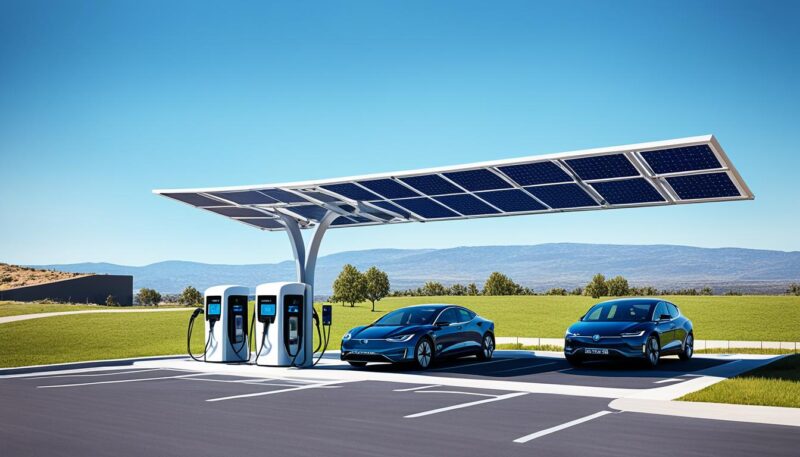


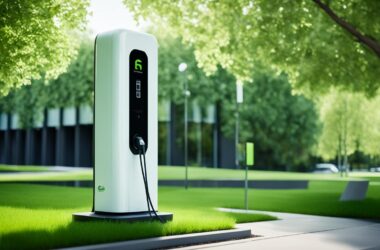
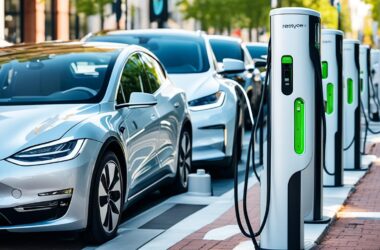
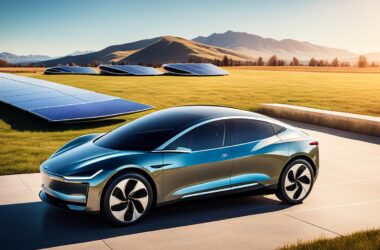
Wow, amazing blog layout! How long have you been blogging for? you made blogging look easy. The overall look of your website is fantastic, as well as the content!
Hi there very nice web site!! Guy .. Beautiful .. Wonderful .. I’ll bookmark your website and take the feeds additionally…I’m glad to seek out so many helpful info here within the submit, we want develop extra techniques in this regard, thanks for sharing. . . . . .
I was suggested this web site by my cousin. I’m not sure whether this post is written by him as no one else know such detailed about my problem. You’re incredible! Thanks!
Exactly what I was looking for, regards for putting up.
Those are yours alright! . We at least need to get these people stealing images to start blogging! They probably just did a image search and grabbed them. They look good though!